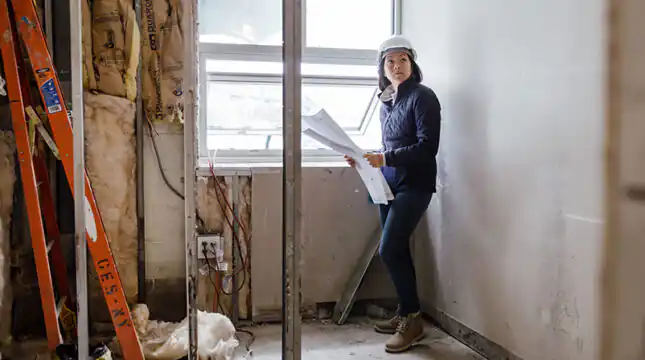Pennsylvania general contractor license requirements
Pennsylvania has no specific education or training requirements for registering as a home improvement contractor. Applicants must detail prior contracting businesses they’ve operated on their registration application, but they are not required to provide details about their work experience.
How long does it take to get your general contractor license?
General contractors who submit their applications online will receive a registration number and printable temporary registration certificate instantaneously, with an official registration certificate arriving later by mail.
Online processing tends to be quicker; mailed applications can take several weeks.
Pennsylvania general contractor registration renewals
Pennsylvania home improvement contractor registrations are valid for two years. You must renew your registration biennially by logging in to your online account on the Attorney General’s website and filling out the “Renew or Update Information” section.
Alternatively, you may submit another application form to renew your registration. Be sure to check the box indicating that you are applying for a registration renewal and include your current registration number on the form.
Local Pennsylvania general contractor business license requirements
Local jurisdictions often have additional requirements, so it’s essential to check them before starting business operations.
Philadelphia
A contractor license is required for businesses performing construction, demolition, or repair work in Philadelphia.
In Philadelphia, contractors listed on a construction permit must carry active insurance on file with the Department of Licenses and Inspections (L&I). These policies typically include workers’ compensation, general liability, and commercial auto insurance. Minimum coverage amounts are set by the city and may change, so contractors should confirm current limits directly with L&I.
Construction or demolition site workers may be required to complete OSHA 10 Construction training or an approved equivalent. Supervisors in certain contractor categories may also need OSHA 30 Construction Safety and Health training.
Pittsburgh
Pittsburgh requires a general contractor license for work performed under a commercial building permit, as well as for certain residential construction and renovation projects.
When applying for a new or renewed license, contractors must provide EPA Lead Renovation, Repair and Painting (RRP) certification, which is typically valid for five years.
All contractors are required to submit a current certificate of insurance showing general liability coverage that meets the city’s minimum requirements.
Insurance must be valid at the job location, and the City of Pittsburgh must be listed as the certificate holder. Some projects may also require the city to be named as an additional insured.
Scranton
Scranton requires contractor licensing for many types of construction work, including residential home improvement projects. Additional licenses may apply for multi-family residential, commercial, industrial or demolition work, depending on the scope of the project.
Because local requirements vary, contractors should contact the City of Scranton directly to confirm which licenses apply and how to complete the application process.
What kind of insurance does a general contractor need in Pennsylvania?
You’ll need general contractor insurance to comply with Pennsylvania’s contractor registration requirements. Some of the types of Pennsylvania business insurance which can help provide important protections include:
General liability insurance
General liability insurance can help provide coverage for potential work-related accidents, such as a client injury or damage to someone’s property.
Learn more about general liability for contractors.
Workers’ compensation insurance
Workers’ compensation insurance can help provide wage protection and coverage for medical expenses if an injury occurs on the job. In Pennsylvania, all employers are legally required to carry workers’ comp coverage.
Learn more about Workers’ Comp for construction workers.
Tools and equipment insurance
Tools and equipment insurance can help cover repairs and replacements if any of your work gear is stolen or damaged.
Commercial auto insurance
Because contractors often drive to different worksites, you may want commercial auto insurance, which can help cover costs related to accidents, such as towing, repairs and rental reimbursement.
Commercial property insurance
If you own or rent property for your general contracting business, commercial property insurance can help cover any damage or vandalism that may occur.
What is the certificate of insurance requirement?
With your registration application, you must submit insurance policy information showing at least $50,000 of personal injury liability coverage and $50,000 of property damage coverage. Contractors who wish to self-insure instead must submit a separate Self-Insurance Certificate of Coverage and Attestation form with their application.







